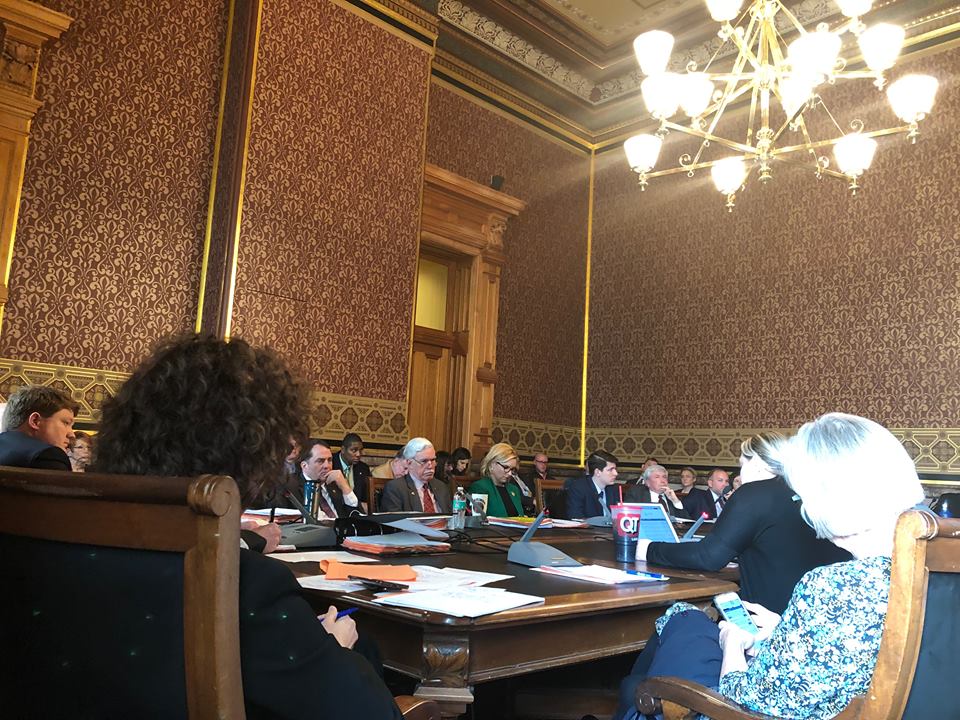The Iowa House Judiciary committee passed House Study Bill 110 on Wednesday afternoon on a narrow 11-10 vote that nearly followed party lines, with the exception of Republican Rep. Andy McKean, who voted against the bill.
Democrats all shared their frustration with the process and what they said is a lack of rationale behind the bill.
Jo Oldson, who was on the subcommittee, said more time should’ve been given to the bill in subcommittee. She called the bill a huge change to a very independent branch of government.
An amendment offered in committee today also drew the ire of Democrats. It allowed the current process to remain in place for selection of district judges.
“I find this process atrocious,” Oldson said. “I don’t know that I’ve been this upset about a bill for a long time.”
Freshman Democrat Rep. Karin Derry said she didn’t hear anything about the issue while campaigning. Issues like mental health, Medicaid and education were mentioned, but nothing about the nominating system.
“Nobody asked for this,” she said. “This is a solution in search of a problem.”
Democrat Rep. Kristin Sunde shared similar concerns as Rep. Derry. She said voices weren’t being heard currently in the process of the bill, even though the bill’s proponents said the logic behind the bill was to give Iowans more of a voice in the judicial nominating process.
“Only four of the dozens (emails) I received expressed support,” she said.
Representative Jennifer Konfrst pointed to a poll in the Des Moines Register that says 54 percent of Iowans approve of how judge’s are selected right now.

Conservative advocacy groups found themselves in the cross-hairs of the Democrats as well. Representative Beth Wessel-Kroeschell read a quote from Chuck Hurley of The Family Leader from the subcommittee, citing concerns about recent rulings against law enforcement, abortion and marriage.
Liz Bennett read through the list of lobbyist declarations, highlighting just three groups who support the bill — the governor’s office, The Family Leader and Americans For Prosperity.
“We have a clear, partisan bent to known far-right organizations who are supporting this,” Bennett said. “That’s a little bit suspicious to me.”
Representative Brian Meyer questioned McKean, who said he didn’t feel there was a problem that needed to be confronted. McKean accepted Meyer’s premise that it would make the selection of justices more partisan.
Republican Rep. Ashley Hinson also yielded and engaged with Meyer. Hinson said the bill is designed to help reduce undue influence by specific members of the commission and help with transparency.
Meyer complained that the amendment was given to Democrats at 1 p.m. — two hours before the 3 p.m. subcommittee was scheduled to start.
Republican Rep. Steven Holt acknowledged the concern and reminded Democrats there would still be chances to amend the bill on the House floor.
“This is just the next step in the process, but there’s plenty of steps left in the process,” he said.
Meyer asked Holt if he’d be willing to pull the bill today since the public hadn’t seen the amendment.
“No, I don’t think it is necessary,” Holt said. “It is just a continuation of the process.”
Holt said the current process, which gives members of the Iowa Bar a say on half of the members of the commission, is flawed. Only 9 percent of eligible attorneys voted on the commission in 2017.
He added that allowing the majority and minority parties in both chambers to appoint individuals would be more representatives of Iowans. Holt said other states use the model Iowa is considering adopted and seven of those are ranked above Iowa.
Meyer asked Holt if he was supporting the bill because he’s upset with some court decision.
“Absolutely not,” Holt said. “I object to judicial activism whether conservative or liberal.”
Representative Mary Wolfe spoke at length about the bill as well. She engaged Hinson briefly and Holt a fair bit.
“I still don’t understand how this process, at least at the state level, is going to in anyway fix any alleged undue influence,” Wolfe said. “But oh well.”
While Holt said the Connecticut plan, which is similar to what legislators are considering, Iowa’s version will not have any sort of confirmation process for the selection.
Wolfe, who along with Meyer is an attorney, was clearly not going to support the bill.
“I absolutely disagree that this bill provides more oversight,” she said.
The initial argument, Wolfe said, was that liberal trial lawyers were electing Iowa’s judges.
“Apparently some of you realized that was a flat out lie,” she said. “So I did appreciate the fact I’m not seeing that GIF popping up on my Twitter any more.”
Holt was confused why Wolfe said it was the first time she heard concern about undue influence.
“I talked about it on Iowa Press sitting right beside you,” he said.
The merit system will be strengthened, Holt said. He was not happy with dark money being spent from liberal groups, just as Democrats expressed curiosity in who was funding a campaign in support of the bill. He took exception with the term “right-wing” organization.
“I’m not going to sit here and allow the term right-wing organization to be used,” he said. “I appreciate that there are people who fight for unborn children in this room today, 12 of which are killed every day. I appreciate the efforts of those who fight for traditional marriage and values and reject the label they’re ‘right-wing.'”
McKean delivered comments during debate on the bill after the amendment passed.
“There’s an old saying, ‘be careful what you pray for,'” McKean said. “(This bill) may very well come back to bite the proponents of this bill. I would also venture to say that we all have decisions that have been made by the courts that we don’t like. We will continue to have decisions by the courts that we don’t like because that’s part of what the judicial process is all about.”
McKean said he practiced law for 35 years and was very impressed with the current judicial process. Judges, he said, have been competent, thoughtful and impartial. While the system should be examined, McKean said this bill isn’t the solution.
“This could’ve been an issue that brought people together,” he said. “Quite frankly I think that’s what the people of Iowa are really begging for. They want us to come down here and not involve ourselves in partisan disputes but try to find some common ground.”
Iowans, he said, would be very discouraged to see what happened in the committee.
“I hope that when the dust settles, that maybe we have a different approach to this,” McKean said.
Wolfe said her Democrat colleagues would support a bill proposing an interim study group on the issue.
Meyer asked Holt if he’d consider a constitutional amendment, but Holt said it was unnecessary since the legislation from 1962 had an escape clause after 10 years.
Holt wrapped things up by saying judicial reform is necessary.
“Any system, including Iowa’s, can always be made better,” he said.
Past and present members of the commission have expressed support to change the process, Holt said. The system has always been political.
“This is the reality and everybody that is involved in this process knows it full well,” Holt said.












